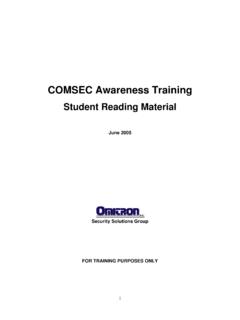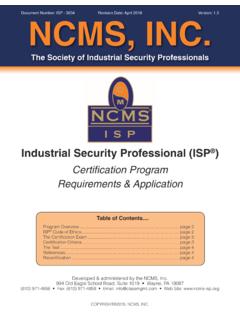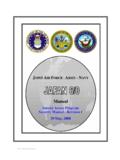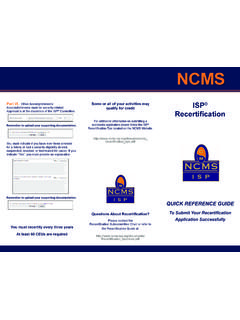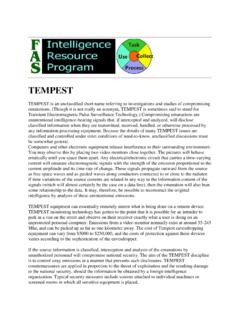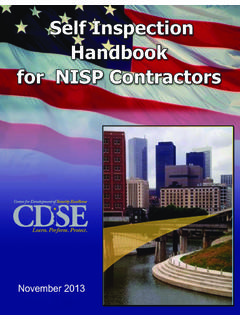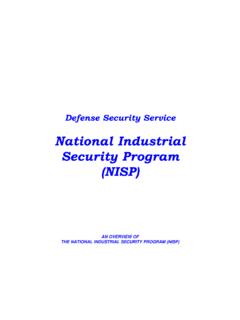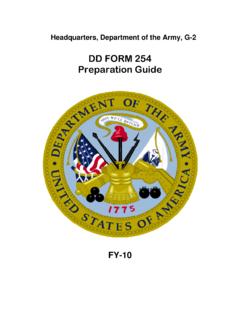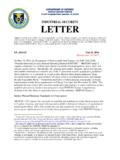Transcription of DRAFT NCMS Industrial Security Professional Certification ...
1 1 Title ISP-2004: Industrial Security Professional Certification Program Manual Version Owner ISP Committee Industrial Security Professional Certification Program ISP Certification Program Manual NCMS, Inc. The Society of Industrial Security Professionals Approved By: ISP Committee Effective/Revision Date: December 2018 Distribution: External Copyright 2018, NCMS, Inc. All rights reserved 2 TABLE OF CONTENTS TOPIC PAGE I. General 4 II. Responsibilities 9 III. Application 12 IV. Certification 12 V. ISP Certification Committee Organization 121 VI.
2 Code of Ethics 14 VII. Recertification 15 VIII. Examination Facts 17 IX. Study References and Sources 19 X. Examination Maintenance and Security 19 XI. Examination Preparation Program 20 XII. Appeals & Complaints Process 20 XIII. Self-Assessments and Audits 22 XIV. Continuous Improvement and Corrective Actions 23 1 Section added 3/12 3 XV. CEU Determination for Chapter Events 25 XVI. Contracts and Subcontracts 252 XVII. ISP Logo and Mark 26 XVIII. Accreditation Mark, Symbol, or Reference 28 RELATED PROGRAM DOCUMENTS (see Executive Director for materials) Program History Control Policy Form (available online only at ) Credit Guide Application Form Review Subcommittee SOP Calculations Plan Certification Certificate 2 Section added 3/12 4 I.
3 GENERAL A. Introduction NCMS created the Industrial Security Professional (ISP ) Certification because the Society saw a need to focus specifically on the needs of the Industrial Security Professional , including their government counterparts. Other existing Security -related Professional certifications are not specific enough to target the Industrial Security specialist who must follow the national Industrial Security Program Operating Manual (NISPOM) and related government Security requirements relative to the protection of government classified information. The ISP provides a recognized and reliable indication of knowledge, competency, and experience of an Industrial Security Professional to apply Industrial Security program management concepts, principles, and practices.
4 The ISP is recognized as the standard of excellence for Industrial Security Professionals. The ISP was accredited by ANSI in September B. Goals 1. Improve professionalism within industry and government Security . 2. Enhance the recognition of experienced industry and government Security professionals. 3. Increase the recognition of NCMS as the premier Security organization. C. Purpose The purpose of the ISP Certification program is two-fold: 1. Provide recognition of the Professional training and qualifications of experienced practitioners of Industrial and government Security , most specifically Industrial Security Facility Security Officers (FSOs) and their government equivalents.
5 2. Provide guidelines for maintaining up-to-date knowledge within the profession. D. Definitions (in the context of a Certification )4 1. Fair: Designed so that every applicant has and follows the same opportunity, rules, exam, and standards. 2. Impartial: Designed so that no outside or inside forces can skew the Certification program in any fashion, particularly by granting favors to a particular person or group. 3. Reliable: Designed so that the examination questions are accurate and the results are repeatable in a statistically verifiable manner. 4. Relevant: Designed so that the examination questions are pertinent to the Certification field; in this case a Facility Security Officer (FSO) in Industrial Security with at least 5 years of relevant experience.
6 E. Eligibility 1. Candidates must have at least five years cumulative experience in the Industrial Security field. NOTE: Military or police experience alone does not qualify; such service must include substantial Industrial Security experience within these professions to qualify for the five-year experience requirement. Each case will be determined based upon its merits. Final determinations will be made by the ISP Certification Committee. 2. Candidates must be working in Industrial Security at least part-time as part of their job description (a minimum of 10% of their total workload) in order for the experience to 3 Added 09/18 to comply with standard.
7 4 Section added 01/15 to comply with standard. 5 3. Candidates do not need to be currently working in Industrial Security to apply for the exam as long as their work history satisfies the five year minimum F. Certification Requirements 1. Candidates must provide a written recommendation from their supervisor. If a candidate does not have a supervisor, a member of the NCMS Board of Directors or an ISP in good standing may provide a 2. Candidates must attain a score of 75% on the ISP Certification Examination. G. Examination Focus and Regulatory Basis The examination focus is for Security professionals who act as Facility Security Officers, or an equivalent, for facilities that protect classified government information and material.
8 The technical basis of the examination is the NISPOM and the requirements of related government Security programs , such as Operations Security (OPSEC), Communications Security (COMSEC), Counterintelligence, Special Access programs (SAP)8, and Self-Assessments. H. Examination Composition and Administration9 1. The ISP Certification examination comprises 100 base questions covering the nine primary areas of Industrial Security Management ( Security Administration and Management, Document Security , Information Systems Security , Physical Security , Personnel Security , International Security , Classification, Security Education, and Audits and Self-Assessments) and ten questions chosen from two of the five elective areas (OPSEC, COMSEC/TEMPEST, Counterintelligence, Special Access programs (SAP), and Intellectual Property).
9 The total number of questions on the examination is 110. Candidates must pre-select their two preferred electives so that five questions from each elective can be included on the individual s exam. The examination is administered utilizing Prometric s global network of test centers and is open book , with approved resource documents available to candidates via a split screen during the exam. (Note: documents are approved by the committee).10 2. The rationale for using an open book examination is to replicate the office environment where references are available and to encourage referencing current documents to ensure the enforcement of the current requirements.
10 This method of examination thus discourages the improper use of memory and experience and emphasizes referring to the correct requirement documents because requirements change 3. The examination is two hours long and is designed so that the candidate will have time to look up some, but not most, questions. 4. The candidate may not consult with other individuals during the examination nor may they use on-line resources. 5. Candidates may not write down questions and remove them from the examination room. Any form of data mining/harvesting such as memorizing questions to give to others is 6. References are listed on the ISP page of the NCMS website ( ).
